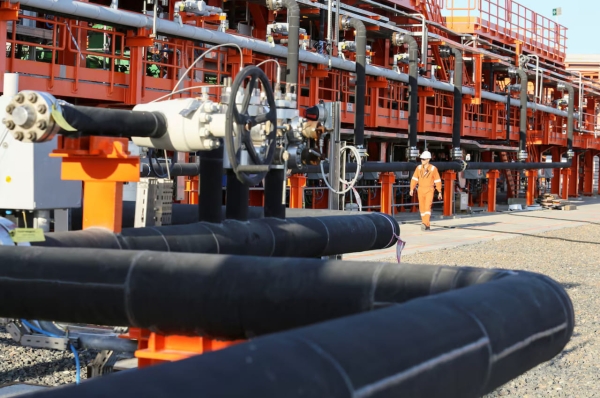Kazakhstan anticipates preliminary results from its multi-billion dollar arbitration proceedings against international oil companies by December, Reuters reported citing Energy Minister Almasadam Satkaliyev. The Central Asian nation initiated claims last year against the companies operating its Kashagan and Karachaganak oilfields, seeking $13bn and $3.5bn, respectively, over contested costs.

The country has a history of significant claims against foreign firms, often viewed as a move to increase its stake in essential oil and gas projects—a practice critics label as “resource nationalism.” However, Kazakhstan’s authorities have refuted these accusations, asserting that their primary goal is to address inflated costs attributed to Western corporations.
The Kashagan field, one of the largest oil discoveries in recent decades, is being developed by a consortium that includes Eni, Shell, TotalEnergies, ExxonMobil, KazMunayGaz, Inpex, and CNPC, collectively known as the North Caspian Operating Company (NCOC). The consortium has invested approximately $50 billion into the project. Similarly, the Karachaganak oilfield is developed by a partnership of Eni, Shell, KazMunayGaz, Chevron, and LUKOIL, which has invested over $27bn.
While requests for comments from NCOC, Eni, Shell, and TotalEnergies went unanswered, Minister Satkaliyev emphasized the confidentiality of the claims, stating, “Everything that relates to the subject of the claim is confidential information. We are talking about the execution of the terms of the production-sharing agreement on Kashagan and Karachaganak.”
Reports from Bloomberg News indicated in April that Kazakhstan had increased its arbitration claims against the Kashagan consortium to over $150bn, although neither the government nor the involved companies have disclosed specifics regarding the claims.
Kazakhstan has a history of resolving disputes with international oil companies. In 2020, the government reached a $1.9bn settlement with the Karachaganak partners, resolving a long-standing disagreement over profit-sharing. Additionally, in 2011, the Kashagan consortium agreed to cover $1bn in extra costs incurred by KazMunayGaz to settle a dispute over the project. A year earlier, the Karachaganak consortium granted the government a 10% stake in the field, valued at $1bn, as part of a resolution agreement.
As Central Asia’s largest economy, Kazakhstan is relying heavily on Kashagan for its future economic prosperity, expressing ongoing concerns about cost overruns and delays in the field’s development. The crude produced at Kashagan contains high levels of toxic hydrogen sulfide, complicating extraction efforts. The field’s production reached approximately 380,000 barrels per day last year.
In addition to the arbitration updates, Satkaliyev reported that Kazakhstan’s oil exports to Germany through the Soviet-era Druzhba pipeline are projected to reach 1.2mn metric tons (equivalent to 24,000 barrels per day) this year. Germany is looking to double its imports from Kazakhstan to 2.5mn tons annually.
Kazakhstan’s role as an oil exporter has grown following Western sanctions imposed on Russian oil amid the ongoing conflict in Ukraine. Although Kazakhstan maintains its alliance with Moscow, it has refrained from taking sides in the conflict or endorsing Moscow’s territorial claims in Ukraine. Germany has expressed interest in expanding trade relations with Kazakhstan, emphasizing the need to ensure that this does not inadvertently undermine Europe’s sanctions against Russia.




